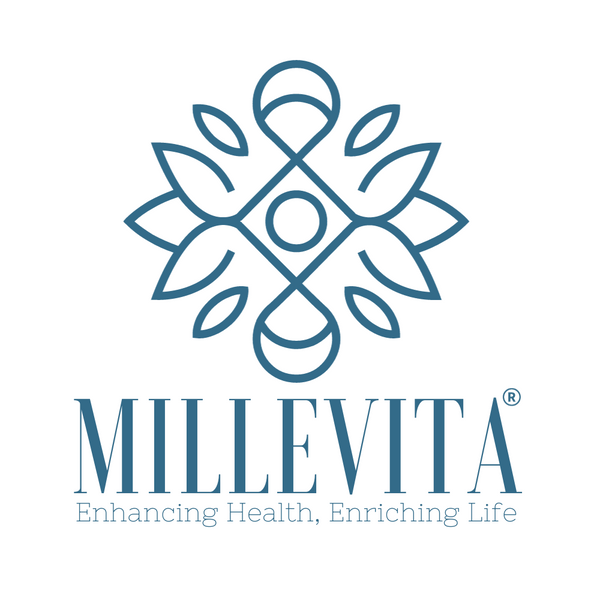
How Antioxidants Support Vascular & Circulatory Wellness
Share
More Than Symptoms: What Circulatory Health Tells Us About Wellbeing
Let’s be honest—when energy or function feels off down there, it’s easy to blame stress, age, or that one-too-many beer. But here’s the thing: performance issues aren’t just a standalone concern. They’re often your body’s polite (or not-so-polite) way of saying: “Hey pal, something’s off under the hood.”
Sure, it’s awkward. But disruptions in vitality can be one of the earliest signs of deeper issues like poor circulation, hormonal imbalance, or oxidative stress—yep, that invisible chaos your cells deal with when you’re living on fries and five hours of sleep.
The good news? You don’t need to panic, pop mystery pills, or sign up for weird late-night infomercial programs. You might just need more antioxidants, better habits, and less stress (shocking, we know). Let’s break it all down—without the doom, gloom, or guilt.
It’s Not Random — Here’s What’s Driving Circulatory Disruption
Okay, so bad dates, nerves, or that weirdly spicy taco might throw things off once in a while. But when changes in performance stick around like a bad playlist on repeat, it’s usually got deeper roots.
At the center of it all? Blood flow. Circulation is a hydraulic system powered by nitric oxide—if your blood vessels are stiff, inflamed, or blocked, the system stalls.
Let’s break down the usual suspects:
- Endothelial dysfunction – Your blood vessels aren’t relaxing like they should. Blame inflammation, high blood pressure, or oxidative stress.
- Low testosterone – It’s not just about energy levels; it affects blood flow and nitric oxide production too.
- Nerve issues – Especially common in people with diabetes or after certain surgeries. If the wiring's off, the signal doesn’t get through.
- Lifestyle overload – Stress, poor diet, no sleep, and no movement are basically kryptonite for vitality.
Oxidative Stress: Quietly Affecting Vascular Health
You know how metal rusts over time? That’s kind of what’s happening inside your body when oxidative stress kicks in. Only instead of rust, it’s your cells, blood vessels, and overall vitality taking the hit.
Oxidative stress happens when your body has more free radicals (those little destructive molecules) than it does antioxidants (the peacekeepers). Left unchecked, these radicals do what radicals do best: cause chaos. Including wrecking the blood vessels that support healthy function.
How? They attack nitric oxide—the stuff that tells your blood vessels to relax and let blood flow freely. No nitric oxide = no solid circulation = trouble for overall performance.
It’s sneaky, too. You won’t feel it happening. But over time, oxidative stress can quietly sabotage not just performance, but heart, metabolism, and hormone systems too.
Why Antioxidants Matter for Vascular and Hormonal Wellness
Oxidative stress isn’t just a buzzword—it’s what happens when your body can’t keep up with damaging free radicals. Over time, this internal imbalance can wear down blood vessels, interfere with healthy circulation, and reduce the availability of nitric oxide, which is essential for vascular relaxation.
Here’s where antioxidants step in. These natural compounds help protect nitric oxide levels, reduce inflammation, and support the flexibility of your blood vessels, making it easier for blood to flow where it’s needed.
Antioxidants also support hormone regulation, particularly testosterone, by helping reduce the oxidative damage that can disrupt hormone production. From heart health to hormone balance, antioxidants offer a wide-reaching benefit that extends to foundational well-being.
Whether through nutrient-rich foods or well-formulated supplements, building antioxidant support into your routine is a science-backed step toward better circulation and sustained vitality.
Essential Antioxidants for Circulation and Vitality
These well-researched antioxidants play an essential role in supporting blood flow, cellular integrity, and overall vitality, especially as they relate to cardiovascular and metabolic wellness.
Daily Practices That Strengthen Long-Term Wellness
Supplements have their place, but lasting change starts with your daily habits. Circulatory wellness relies on healthy blood flow, balanced hormones, and a nervous system that isn’t in constant overdrive. These lifestyle upgrades are simple, effective, and science-backed.
- Move with purpose. Regular movement—walking, cycling, strength training—helps circulation and heart health.
- Fuel your body well. A nutrient-rich diet full of greens, berries, healthy fats, and whole grains supports vascular function and hormone balance.
- Prioritise quality sleep. Restorative sleep is essential for testosterone production, mood regulation, and metabolic repair.
- Manage your stress response. Chronic stress can disrupt hormone levels and circulation. Breathwork, nature walks, or digital downtime can help reset your system.
- Rethink your vices. Smoking, excessive alcohol, and prolonged inactivity can dramatically impact vascular health. Cutting back—even gradually—makes a measurable difference.
Understanding the Signals Your Health Sends
Vitality issues aren’t just about function—they’re often a sign that your vascular health, hormone balance, or stress levels need attention. The upside? That means there’s room for real improvement, not just a temporary fix.
Small, consistent lifestyle shifts—like better nutrition, restful sleep, regular movement, and targeted antioxidant support—can powerfully impact overall wellness.
This isn’t about perfection. It’s about tuning in, taking action, and making choices that support your long-term health and confidence—inside and out.
Disclaimer
This article is intended for informational purposes only and does not replace professional medical advice, diagnosis, or treatment. Please consult your healthcare provider before making any decisions about supplements or lifestyle changes.
References
- Mayo Clinic. Erectile Dysfunction – Symptoms and Causes. Retrieved June 11, 2025.
- Harvard Health Publishing. Does Drinking Tea Really Help Health?. Retrieved June 11, 2025.
- American Heart Association. What is Atherosclerosis?. Retrieved June 11, 2025.
- Mayo Clinic. Erectile Dysfunction: A Sign of Heart Disease?. Retrieved June 11, 2025.
- Harvard Health Publishing. Flavonoids: The Secret to Health Benefits of Drinking Black and Green Tea. Retrieved June 11, 2025.
- Ramasamy, R., Bhattacharyya, S., Kohn, T.P., & Miller, L.E. (2024). Antioxidant Supplementation for Erectile Dysfunction: Systematic Review and Meta-Analysis of Double-Blind, Randomized, Placebo-Controlled Trials. World Journal of Men's Health. Retrieved June 11, 2025.
- Liu, M., & Zhang, P. (2024). Association between Composite Dietary Antioxidant Index and Erectile Dysfunction. Sexual Medicine, 12(6), qfae092. Retrieved June 11, 2025.
- Sheweita, S.A., Meftah, A.A., Sheweita, M.S., & Balbaa, M.E. (2020). Erectile Dysfunction Drugs Altered the Activities of Antioxidant Enzymes, Oxidative Stress and the Protein Expressions of Some Cytochrome P450 Isozymes. PLOS ONE. Retrieved June 11, 2025.
- Zhu, H., Chen, S., Ye, Q., et al. (2024). New Research Highlights Role of Dietary Antioxidants in Reducing Erectile Dysfunction Risk. Scientific Reports. Retrieved June 11, 2025.
- Verywell Health. (2014). Which Supplements for Erectile Dysfunction Actually Work?. Retrieved June 11, 2025.



